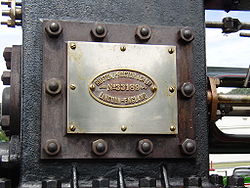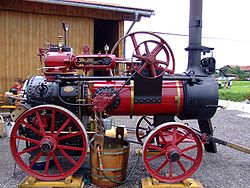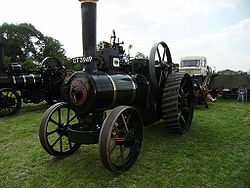
Ruston, Proctor and Company
Encyclopedia

Lincoln, Lincolnshire
Lincoln is a cathedral city and county town of Lincolnshire, England.The non-metropolitan district of Lincoln has a population of 85,595; the 2001 census gave the entire area of Lincoln a population of 120,779....
, England
England
England is a country that is part of the United Kingdom. It shares land borders with Scotland to the north and Wales to the west; the Irish Sea is to the north west, the Celtic Sea to the south west, with the North Sea to the east and the English Channel to the south separating it from continental...
in 1857, and were manufacturers of steam tractor
Steam tractor
A steam tractor is a vehicle powered by a steam engine which is used for pulling.In North America, the term steam tractor usually refers to a type of agricultural tractor powered by a steam engine, used extensively in the late 19th and early 20th centuries.In Great Britain, the term steam tractor...
s and engines. They later became Rustons and then Ruston & Hornsby.
History


Joseph Ruston
Joseph Ruston was an English engineer and manufacturer and Liberal Party politician.Ruston was the son of Robert Ruston a farmer of Chatteris, Isle of Ely and his wife Margaret Seward. He was educated at Wesley College, Sheffield and became an apprentice at the Sheffield cutlery firm of George...
became a partner in the company in 1857, and the company changed name to Ruston, Proctor & Co. and grew to become a major agricultural engineering firm.
In 1918 the firm merged with the established Richard Hornsby & Sons
Richard Hornsby & Sons
Richard Hornsby & Sons was an engine and machinery manufacturer in Lincolnshire, England from 1828 until 1918. The company was a pioneer in the manufacture of the oil engine developed by Herbert Akroyd Stuart and marketed under the Hornsby-Akroyd name. The company developed an early track system...
company, from Grantham
Grantham
Grantham is a market town within the South Kesteven district of Lincolnshire, England. It bestrides the East Coast Main Line railway , the historic A1 main north-south road, and the River Witham. Grantham is located approximately south of the city of Lincoln, and approximately east of Nottingham...
, Lincolnshire
Lincolnshire
Lincolnshire is a county in the east of England. It borders Norfolk to the south east, Cambridgeshire to the south, Rutland to the south west, Leicestershire and Nottinghamshire to the west, South Yorkshire to the north west, and the East Riding of Yorkshire to the north. It also borders...
.
Rustons were primarily steam engineers, manufacturing portable
Portable engine
A portable engine is a small steam engine, mounted on wheels or skids, which is used for driving machinery using a belt from its flywheel. It is not self-propelled and is towed to the work site by horses or bullocks, or even a traction engine. Portable engines were used mainly for driving...
, stationary
Stationary steam engine
Stationary steam engines are fixed steam engines used for pumping or driving mills and factories, and for power generation. They are distinct from locomotive engines used on railways, traction engines for heavy steam haulage on roads, steam cars , agricultural engines used for ploughing or...
and traction engine
Traction engine
A traction engine is a self-propelled steam engine used to move heavy loads on roads, plough ground or to provide power at a chosen location. The name derives from the Latin tractus, meaning 'drawn', since the prime function of any traction engine is to draw a load behind it...
s, boiler
Boiler
A boiler is a closed vessel in which water or other fluid is heated. The heated or vaporized fluid exits the boiler for use in various processes or heating applications.-Materials:...
s, and associated engineering products such as winding gear, shafts and pulleys. Threshing machines, clover hullers, corn mills, maize shellers and pumps for steam power were also made. As well as engines for agriculture machines Rustons made railway locomotives, industrial equipment and mining machinery. The company also expanded into electrical and diesel engine
Diesel engine
A diesel engine is an internal combustion engine that uses the heat of compression to initiate ignition to burn the fuel, which is injected into the combustion chamber...
ering.
The firm were one of the first to manufacture steam-powered excavating machinery – in the 1880s producing the "Dunbar & Ruston's" steam navvy
Steam shovel
A steam shovel is a large steam-powered excavating machine designed for lifting and moving material such as rock and soil. It is the earliest type of power shovel or excavator. They played a major role in public works in the 19th and early 20th century, being key to the construction of railroads...
(excavator). These 2 cu yd machines were used in the construction of the Manchester Ship Canal
Manchester Ship Canal
The Manchester Ship Canal is a river navigation 36 miles long in the North West of England. Starting at the Mersey Estuary near Liverpool, it generally follows the original routes of the rivers Mersey and Irwell through the historic counties of Cheshire and Lancashire. Several sets of locks lift...
. In 1906 they built the "Ruston Light Steam Shovel", and exhibited it at the Royal Agricultural Show of 1907 held in Lincoln, the machine being of 3/4 cu yd capacity.
The firm later became Ruston-Bucyrus
Ruston-Bucyrus
Ruston-Bucyrus Ltd was an engineering company established in 1930 and jointly owned by Ruston and Hornsby based in Lincoln, England and Bucyrus-Erie based in Bucyrus, Ohio, the latter of which had operational control and into which the excavator manufacturing operation of Ruston and Hornsby was...
.
Preserved machines
- Ruston Proctor reg. no. CT3949 traction engine no. 33189.Photo
- Ruston Proctor works no. 51168 (1916) petrol locomotive with Phyllis Rampton TrustPhyllis Rampton TrustThe Phyllis Rampton Narrow Gauge Railway Trust is a British charity which is registered with the British Charity Commission as 292240 under the classification of "Education/TrainingEnvironment/Conservation/Heritage"...
.

